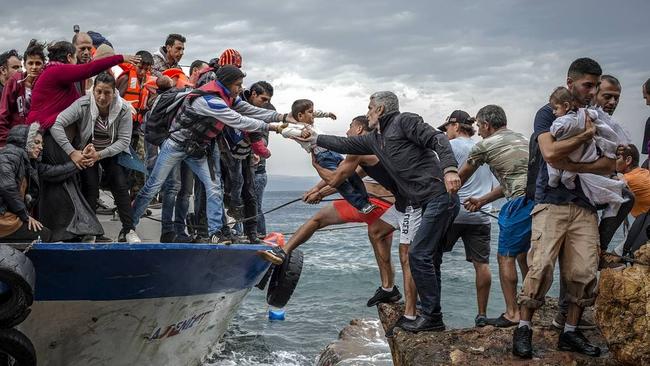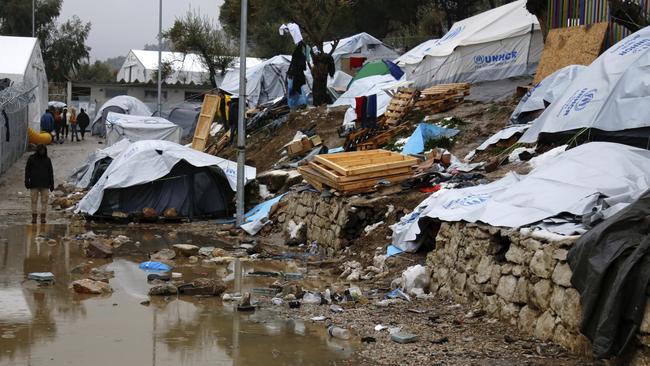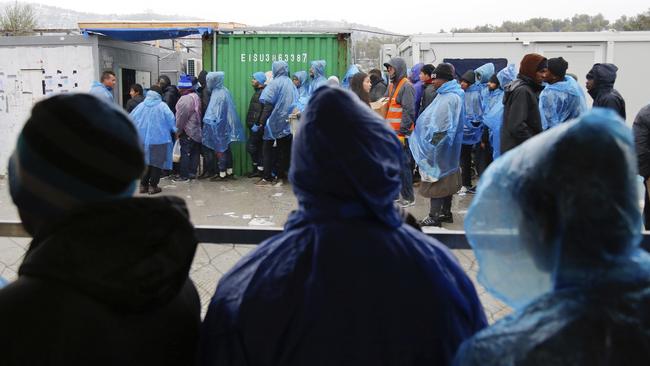Refugees need our help. But some of them aren’t what they seem
While at a refugee camp in Greece, journalist Natasha Exelby noticed a level of luxury that was at odds with the situation. Was this a refugee camp or a resort?

Rendezview
Don't miss out on the headlines from Rendezview. Followed categories will be added to My News.
It was autumn but still subzero temperatures at the refugee camp in Berkasovo, Serbia.
The cold cut through your bones with a vicious wind whipping mud-caked ice through the air. Refugees shivered around fires lit from the remnants of their summer clothes.
A little girl in a purple Sesame Street dress with pink tights and matching bows in her hair ran over to me. “I’m Amira! What’s your name?” she cheerfully asked in Arabic.
Her eyes sparkled as she innocently smiled at the weird white lady with a microphone. Her stare was so intoxicating you could almost look straight past the third degree burns that wrapped over her left eye.
“Chemical weapons … ” her mother explains.
Amira didn’t think she was brave or special. Why would she? Every person in that camp had a story to tell. Everyone knew someone who had been killed. In Amira’s five years she’d already stared death in the face and won. And so, like millions, Amira’s parents rolled the dice for a spot on a leaky boat, only to move on to rubbish- riddled camps where they sleep on the side of the road with rationed food supplies. It was grim, but comparably paradise.
Six months later I was on the Greek Island of Lesbos. As the gateway to Europe, close to one million refugees have passed through there in the past 18 months and conservative estimates suggest at least 5000 have drowned.

Moria is the main camp hosting people just like Amira. But there’s also a smaller camp on the water front where about 100 young Moroccan and Pakistani men were staying.
They were munching on takeaway burgers and guzzling Gatorade. Eminem was pumped out by a portable speaker connected to an iPhone. There was a ping pong table and many were shirtless, sunbaking by the water. Some had blow up pool toys to laze on in the Mediterranean. Was this a refugee camp or a resort?
As soon as our crew entered the camp, they formed a scrum around us. They pushed, shoved and groped me. They were aggressive, impatient and entitled.
A 20-something-year-old well-built Moroccan man called Hamza towered over me. His hair was slicked back and parted with gel to frame his cleanly shaven face.
In perfect English he barked “I cannot get a job in my country!” as he sucked away on a cigarette. “Sometimes the water doesn’t work in my house,” he continued. His clean manicured hands indicated the closest he’d come to a war zone was a game of Call Of Duty. And so I thought “this is what an economic migrant looks like”.
A European Union deal struck with Turkey in May 2016 meant anyone trying to claim asylum from Pakistan or Morocco would be sent back because they weren’t fleeing persecution. This infuriated the men. They were getting louder, rougher and closer, “We are all humans!” they chanted with venom. “What makes us different to the Syrians, Afghans and Iraqis?” Well, for a start you’re fleeing a bad economy not bunker bombs.
“We paid people smugglers 10,000 euros, we don’t get that money back!” Yeah, that’s because they’re people smugglers not travel agents. They’re not renowned for excelling in customer service surveys, I thought to myself.

My Pakistani producer was livid. She felt the men were giving her country a bad name. They were a minuscule minority spitting in the face of genuine asylum seekers. They’re bottom feeders riding the wave of human devastation.
“Economic migrant” isn’t just a buzzword politicians throw around to justify Nauru. Some people who risk their lives at sea aren’t hoping for peace, they’re hunting for an upgrade. And yes, I understand why they would want to leave Pakistan or Morocco, but like other economic migrants before them, they need to stand in line.
As the chorus of support for asylum seekers grows in this country, there is a gaping hole in the quest for justice. Just because someone sews their mouth shut doesn’t mean they deserve citizenship.
The Amiras of the world need our help. They need us to open our hearts and our borders. But that can never be effectively policed if we give a voice (and visa) to the slim but burdening minority who are poisoning the plight of the truly persecuted through selfish and unconscionable channels. They aren’t asylum seekers. They are economic migrants. If we victimise, we legitimise, and that’s not right.
Natasha Exelby is an Australian journalist and broadcaster who recently returned from the Middle East


